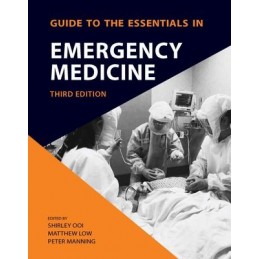- Obniżka


 Dostawa
Dostawa
Wybierz Paczkomat Inpost, Orlen Paczkę, DHL, DPD, Pocztę, email (dla ebooków). Kliknij po więcej
 Płatność
Płatność
Zapłać szybkim przelewem, kartą płatniczą lub za pobraniem. Kliknij po więcej szczegółów
 Zwroty
Zwroty
Jeżeli jesteś konsumentem możesz zwrócić towar w ciągu 14 dni*. Kliknij po więcej szczegółów
This book aims to achieve a fine balance between a practical evidence-based tool, that can be carried around to be used at the patients’ bedside, and a comprehensive reference with sufficient information for examination requirements in Emergency Medicine, both at undergraduate and postgraduate level.
This edition preserves several of its predecessor’s hallmark features, in particular::
Opis
PART 1 COMMON PRESENTATIONS IN ADULT PATIENTS
1 Altered Mental State
2 Bleeding, Gastrointestinal Tract
3 Bleeding, Vaginal, Abnormal
4 Blurring of Vision
5 Breathlessness, Acute
6 Diarrhoea and Vomiting
7 Fever
8 Giddiness
9 Haemoptysis
10 Headache
11 Hyperventilation
12 Jaundice
13 Lower Limb Swelling
14 Pain, Abdominal
15 Pain, Chest, Acute
16 Pain, Joint, Peripheral
17 Pain, Low Back
18 Pain, Scrotal and Penile
19 Palpitations
20 Poisoning, General Principles
21 Red Eye
22 Seizure
23 Shock/Hypoperfusion States
24 Stridor
25 Syncope
26 Trauma, Multiple, Initial Management
27 Urinary Retention, Acute
28 Violent and Psychotic Patients
29 Weakness
PART 2 SPECIFIC CONDITIONS
PART 2A | AIRWAY AND RESUSCITATION
30 Airway Management/Rapid SequenceIntubation
31 Allergic Reactions/Anaphylaxis
32 Cardiac Arrest Algorithms
33 Cardiogenic Shock
34 Neurogenic Shock
35 Sepsis/Septic Shock
PART 2B | CARDIOVASCULAR EMERGENCIES
36 Aortic Emergencies
37 Bradydysrhythmias
38 Coronary Syndromes, Acute
39 Heart Failure, Acute
40 Hypertensive Crises
41 Limb Ischaemia, Acute
42 Pulmonary Embolism
43 Tachydysrhythmias
44 Venous Emergencies
45 Other Heart Conditions
PART 2C | RESPIRATORYEMERGENCIES
46 Asthma
47 Chronic Obstructive Pulmonary Disease
48 Pneumonia, Community Acquired
49 Pneumothorax
50 Respiratory Failure, Acute
PART 2D | GASTROINTESTINAL EMERGENCIES
51 Appendicitis, Acute
52 Hepatic Encephalopathy, Acute
53 Hepatobiliary Emergencies
54 Intestinal Obstruction
55 Ischaemic Bowel/Mesenteric Ischaemia
56 Pancreatitis, Acute
57 Peptic Ulcer Disease/Dyspepsia
58 Perianal Conditions
PART 2E | ENDOCRINE/METABOLIC EMERGENCIES
59 Acid-Base Emergencies
60 Adrenal Insufficiency, Acute
61 Diabetic Ketoacidosis andHyperosmolar Hyperglycaemic State
62 Fluid and Electrolyte Disorders
63 Hypoglycaemia
64 Thyroid Emergencies, Thyroid Crisisand Myxoedema
PART 2F | RENAL ANDGENITO-URINARY EMERGENCIES
65 Renal Emergencies
66 Urinary Tract Infections
67 Urolithiasis
PART 2G | NEUROLOGICEMERGENCIES
68 Meningitis
69 Migraine, Tension and ClusterHeadache
70 Stroke
71 Subarachnoid Haemorrhage
72 Transient Ischaemic Attack
73 Giant Cell Arteritis
PART 2H | INFECTIOUSDISEASES
74 Dengue Fever
75 Coping with Emerging InfectiousDiseases in the Emergency Department
76 Malaria
77 Needlestick/Body Fluid Exposure
78 Tetanus
PART 2I | HAEMATOLOGIC/ONCOLOGIC EMERGENCIES/PALLIATIVECARE
79 Administration of Blood Products inthe Emergency Department
80 Emergency Anticoagulation Reversal
81 Oncologic Emergencies
82 Palliative and End-of-life EmergencyCare
PART 2J | DERMATOLOGIC EMERGENCIES
83 Introduction to Dermatology inEmergency Care
83A Inflammatory Dermatological Conditions
83B Cutaneous Adverse Drug Reactions
83C Infections and the Skin
83D Sexually Transmitted Infections and HIVPost-exposure Prophylaxis
PART 2K | GERIATRICEMERGENCIES
84 Geriatric Emergencies
PART 2L | TOXICOLOGY
85 Poisoning, Benzodiazepine
86 Poisoning, Cyclic Antidepressants
87 Poisoning, Organophosphates
88 Poisoning, Paracetamol
89 Alcohol Intoxication and Poisoningwith Other Alcohols
90 Poisoning, Carbon Monoxide
91 Poisoning, Digoxin
92 Poisoning, Salicylates
93 Poisoning, Novel PsychoactiveSubstances
94 Poisoning, Serotonin Syndrome
PART 2M | TOXICOLOGY (INCLUDING BITES)
95 Bites, Mammalian and Human
96 Snake-related Injuries
PART 2N | SURGICALAND ORTHOPADIC TRAUMA/INFECTIOUS EMERGENCIES
97 Trauma,Abdominal
98 Trauma,Chest
99 Trauma,Head
100 Trauma and Infections, Hand
101 Trauma, Lower Extremity
102 Trauma, Maxillofacial
103 Trauma, Pelvic
104 Trauma, Spinal Cord and Cervical SpineClearance
105 Trauma, Upper Extremity
106 Wound Care and Management
107 CrushSyndrome
108 Trauma,Paediatric
109 Trauma,in Pregnancy
PART 2O | ENT EMERGENCIES
110 Common Ear, Nose and Throat Emergencies
PART 2P | EYE EMERGENCIES
111 Eye Emergencies
PART 2Q | PSYCHIATRIC EMERGENCIES
112 Assault (Non-sexual)
PART 2R | OBSTETRIC AND GYNAECOLOGIC EMERGENCIES
113 Eclampsia
114 Ectopic Pregnancy
115 Pelvic Inflammatory Disease
116 Emergency Delivery of the Newborn
PART 2S | ENVIRONMENTAL EMERGENCIES
117 Burns, Major
118 Burns, Minor
119 Electrical and Lightning Injuries
120 Hyperbaric Emergencies
121 Hyperthermia
122 Submersion Injuries
PART 2T | IMAGING
123 Emergency CT Brain Interpretation
124 Emergency Ultrasound
125 Views of X-rays to Order
126 Emergency CT Abdomen and PelvisInterpretation
127 Emergency CT Thorax Interpretation
PART 2U | PHARMACOLOGY
128 Prescribing in Pregnancy
129 Commonly Used Emergency Drugs in Adults
130 Drugs to Avoid in G6PD Deficiency
PART 2V | PAEDIATRICEMERGENCIES
131 Child with Acute Abdominal Pain
132 Child with Breathlessness
133 Child/Baby, Crying
134 Child with Diarrhoea
135 Child with Fever
136 Child, Fitting
137 Child with Vomiting
138 Paediatric Asthma
139 Bronchiolitis
140 Fluid Replacement in Paediatrics
141 Newborn Resuscitation in the EmergencyDepartment
142 Non-accidental Injury in Paediatrics
143 Paediatric Drugs and Equipment
144 Trauma, Paediatric
145 Child with Altered Mental State
PART 2W | MISCELLANEOUS USEFUL INFORMATION
146 Common Emergency Procedures
147 Pain Management and Nerve Blocks
148 Procedural Sedation
149 Simple Statistics
Indeks: 46287
Autor: Catherine Hagan Hennessy
Extending quality of life
